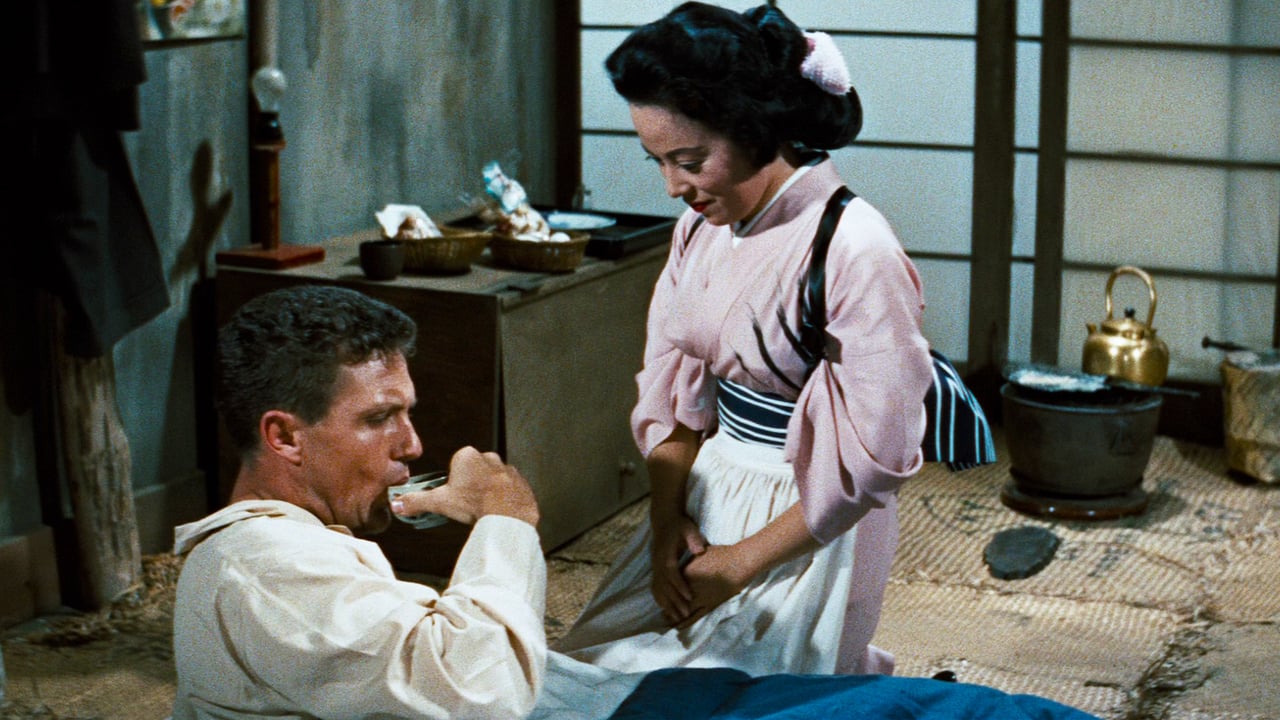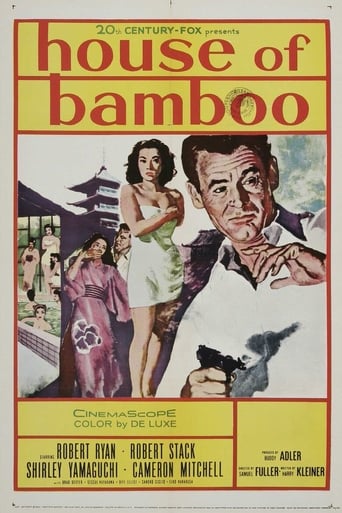



That was an excellent one.
Although it has its amusing moments, in eneral the plot does not convince.
View Morea film so unique, intoxicating and bizarre that it not only demands another viewing, but is also forgivable as a satirical comedy where the jokes eventually take the back seat.
View MoreThe movie's not perfect, but it sticks the landing of its message. It was engaging - thrilling at times - and I personally thought it was a great time.
View MoreDue to the gangster milieu, this is often classified as a film noir and due to its plot lifted from the earlier crime-doc, A Street With No Name: it's more like the latter crossed with Love Is A Many Splendored Thing; probably no coincidence it was made by the same studio the same year. And even though this is a tough crime film about imported corruption from America co-existing with the army, it is full of pretty picture postcard moments and rich with yearning violins that soar whenever the kimono girl looks longingly at wooden Robert Stack; it so many ways it lacks the out-of-control hysteria that makes Samuel Fuller films interesting (Shock Corridor, for instance, or The Naked Kiss, both gritty and kinetic), but there are enough set pieces here to make this interesting--a spectacular finale atop a Tokyo amusement park, and a smoky robbery, and as always, Robert Ryan delivers a quietly menacing performance, reliably sinister and making the 102 minutes worthwhile
View MoreHouse of Bamboo is directed by Sam Fuller who also co-writes with Harry Kleiner. It stars Robert Ryan, Robert Stack, Shirley Yamaguchi and Cameron Mitchell. It's a CinemaScope production with colour by De Luxe, with photography by Joseph MacDonald. Leigh Harline scores the music and the film is a loose remake of The Street with No Name (1948), where Kleiner & MacDonald were also involved. The film is exclusively shot on location in Japan.Tokyo, 1954, and an underworld outfit of American ex-servicemen are thriving on criminal activity. Their newest recruit is Eddie Spanier (Stack), in town to hook up with an old friend, his plans go awry on the news that his pal was killed during a robbery. But he catches the eye of the mob leader, Sandy Dawson (Ryan), and so begins a relationship that will have far reaching consequences for everyone involved with the two men.A train draws to a halt on a bridge in snowy Tokyo, at its point of stopping the train is perfectly overlooked by a snow capped Mount Fuji. It's a moment of beauty, quite serene, then violence explodes as the train is robbed and death shatters the moment. And so Sam Fuller's House of Bamboo begins. One of the first Hollywood movies to be shot in Japan post World War II, it's a film that's as gritty as it is surprisingly violent. Yet the film is very beautiful in texture, courtesy of the location photography by the talented MacDonald who utilises the Scope format to capture some incredible visual treats. For this "noir-a-like" picture there's no shadows and fog, or off kilter angle plays, what there is is a beauty beset by ugly criminal things. Add in some Fuller oddity tones, terse dialogue in the script and some memorable moments of anger, and you get a film that can now be viewed as influential. Even if it's a picture that's hard to confidently recommend to serious fans of gangland type thrillers.Expectation, as most film lovers know, can be a burden that's capable of spoiling many a nights viewing, with that in mind, House of Bamboo comes with a warning. For in spite of the synopsis lending one to think this is a brooding nasty picture about underworld crims, it's actually more comic book than hard boiled, and a massive dose of belief suspension is needed to run with the flow. There's also an issue with some flabby filler scenes involving the relationship between Stack & Yamaguchi, so much of an issue that were it not for a great smoke bomb based escape sequence leading up to the middle third, and some splendid homo-erotic subtext in the gang, the film would find it hard to fight off charges of being melodramatic for potential romance's sake. But Fuller manages to overcome the narratives problems to finish with a most intriguing and interesting film.His cast are very efficient, where Stack is a nice fit for his character (can't say no more because of spoilers), Ryan is ominously coiled spring like and Mitchell is a chunky ball of menace. Then there is of course the director enjoying dallying with themes of duality, betrayal and racial indifference, all captured by his wonderfully fluid camera work. And thankfully the film is crowned off by an excellent finale set on a spinning rooftop amusement park viewer, one minute a stunning view across Tokyo, the next gunshots rattling the air like intruders invading your home. Beginning with stark violence and ending in much the same way, the overriding feeling seems to be that beauty can quite quickly become ugly.The positives far outweigh the negatives in the House of Bamboo. 7/10
View MoreAn Army cop goes to Tokyo posing as an American mobster to track down the men responsible for killing fellow soldiers. This is a remake of the 1948 film noir "The Street with No Name," with the locale changed to Japan. While the location shooting adds authenticity, this one falls short of the original, which was nothing great to begin with. The acting is mostly uneven. Ryan plays the heavy, the sort of role he could play in his sleep. Stack tries so hard to make the cop into a tough guy that he seems to be doing an impression of Humphrey Bogart. Hayakawa, who would next appear in "The Bridge on the River Kwai," has a minor role as a Japanese official. Not one of Fuller's better films.
View MoreSam Fuller's remake of 1948's, 'The Street With No Name', this is wonderful. It may not be full on noir, certainly it is in colour and cinemascope, but for me with family in Japan and a fascination for Tokyo, this is breathtaking. It helps, of course, that the cinematography is so sublime and that Fuller is so taken with the place that he includes so many incidental details, like street vendors and talk of the minutiae of Japanese culture. The story itself follows closely the earlier documentary style except here, surely, the settings are more dramatic. The movie does slow a bit after halfway but picks up magnificently for the final magnificent finale. Sandy Dawson is as effective as he was in the original and indeed all the many Americans and Japanese acquit themselves well . A good film by any standards this is a must see for anyone with the slightest interest in seeing 50s Tokyo.
View More